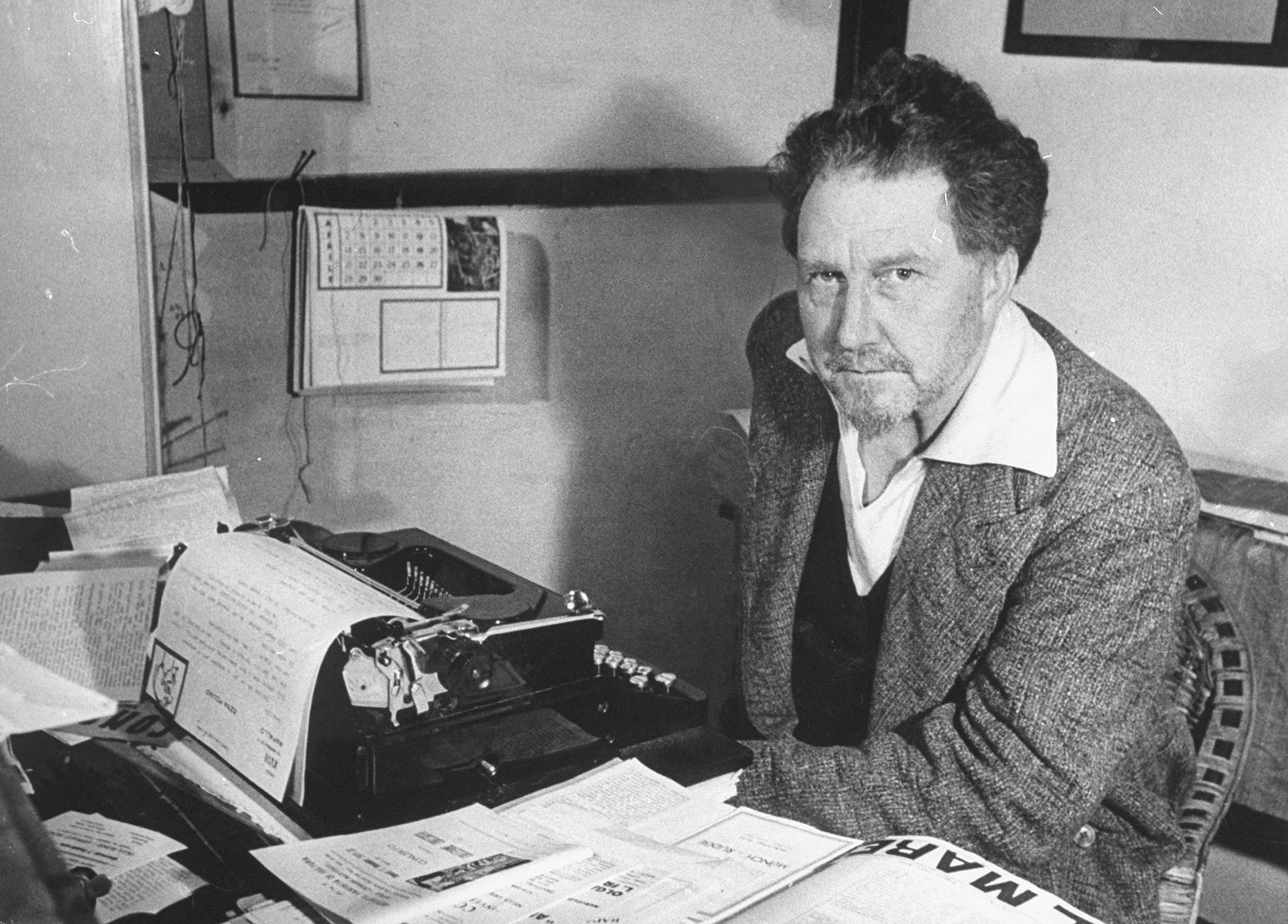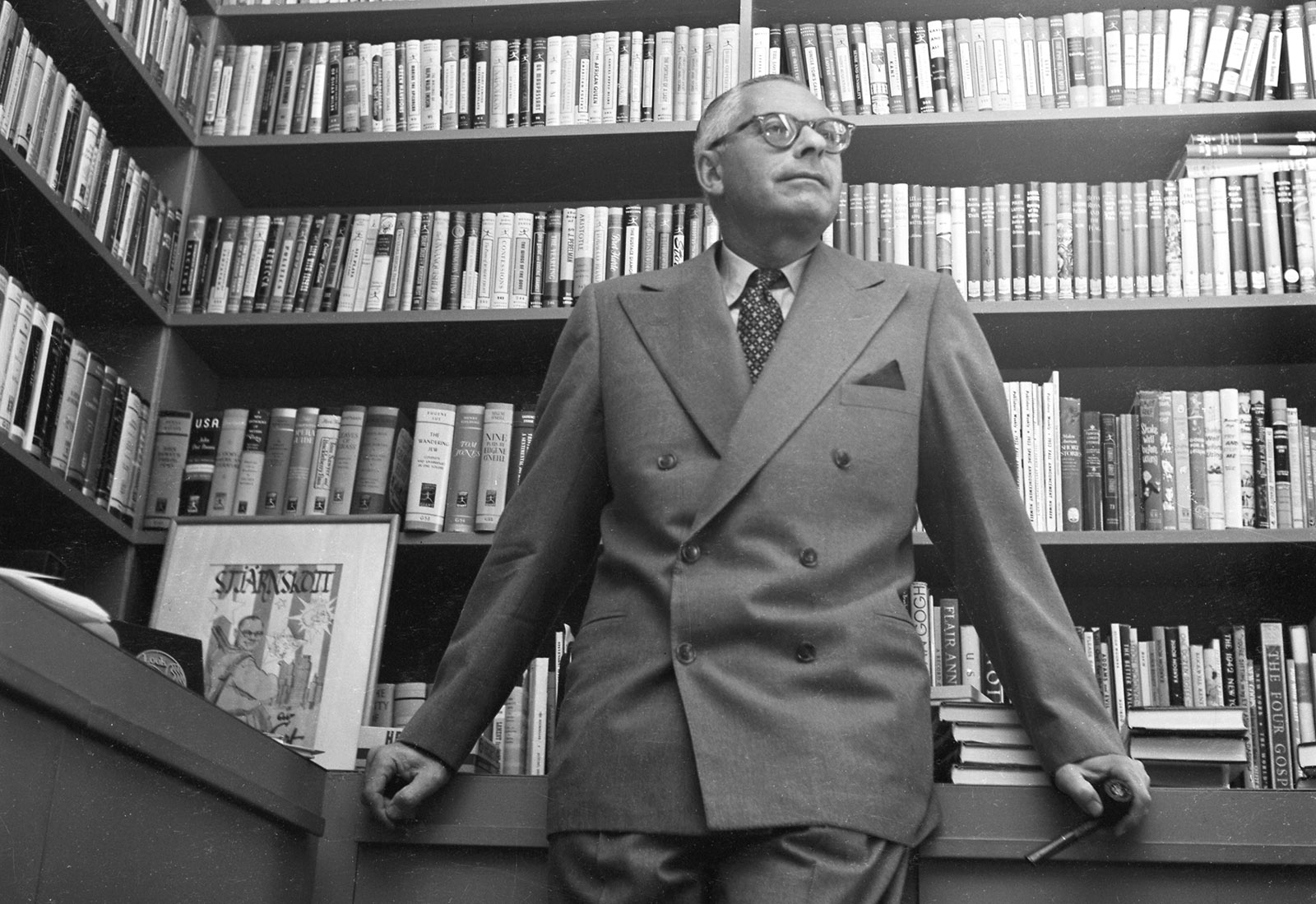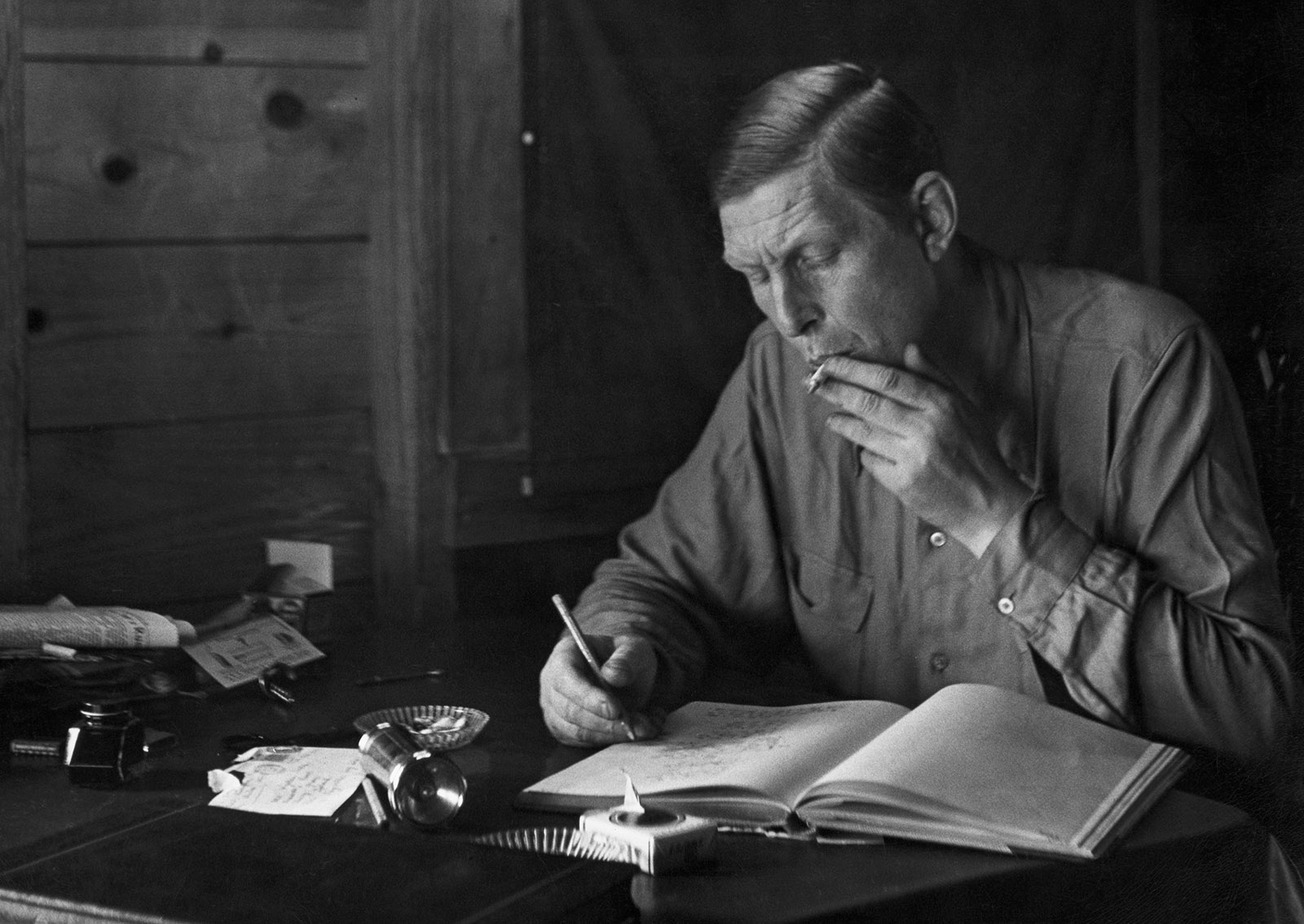In 1945, when Bennett Cerf of Random House was preparing to send to the printer An Anthology of Famous English and American Poetry, edited by William Rose Benét and Conrad Aiken for the Modern Library series, he omitted twelve early poems by Ezra Pound that Aiken had included in a 1927 anthology on which the new book had been based. In place of the poems, a note explained that, over Aiken’s protest, the publishers “flatly refused at this time to include a single line of Mr. Ezra Pound. This is a statement that the publishers are not only willing but delighted to print.”
In the years since Pound wrote those poems, he had become notorious for his fascist politics, florid anti-Semitism and racism, and hero-worshipping praise for Hitler and Mussolini. He stayed in Italy during the war, insisting on making radio broadcasts to American troops, urging them to drop their weapons and stop fighting on behalf of Jews and everyone else whom Pound hated. For these broadcasts, he was arrested after the war and charged with treason against the United States. At the end of 1945, he was awaiting trial in Washington, D.C.
In the eyes of many writers at the time, Cerf’s refusal to reprint Pound’s poems adopted the same logic that the Nazis had used when burning books by Jews and leftists. In January 1946, a few weeks after the anthology appeared, the critic of the New York Herald Tribune, Lewis Gannett, criticized Cerf’s decision in his widely read column, Cerf replied, in a letter that Gannett printed: “Pound, by his deliberate and consistent actions over a long period of years, sacrificed any claims, in my opinion, either to the title ‘poet’ or the title of ‘American.’” Cerf continued, “Damn it, Lewis, this war is not over. The same ideology that caused it… is still too prevalent in the world. Every time you parade the work of a man who represents such ideas, especially while he still lives, you are in a sense glorifying him, and giving tacit approval to his point of view.” Cerf wrote that his partners Donald Klopfer and Robert Haas “firmly agree on this point.”
The controversy spilled into national magazines, and Cerf met with both wide support and wide disagreement. Two months later, under pressure from writers he valued, especially Henry Steele Commager and Max Lerner, Cerf reversed his decision, and agreed to print the poems in future printings of the anthology. But he continued to insist that he had been right the first time.
The issues at stake in the arguments over the anthology have never ceased to be contentious. The same questions recur in recent arguments—to choose only one among dozens of possible examples—over whether Martin Heidegger should be banished from philosophy reading lists because he was a Nazi. W.H. Auden, one of Cerf’s authors at Random House, wrote Cerf some letters about Cerf’s action and its consequences that may still be clarifying today.
Auden first wrote to Cerf on January 29, 1946, a week after Cerf’s letter appeared in Gannett’s Herald Tribune column:
Dear Bennet[t] Cerf,
It was with surprise and dismay that I heard of the exclusion, at your request, of poems by Ezra Pound from the Modern Library anthology.
I decided not to do or say anything until you had had an opportunity to state your case; now, having read your letter in The Herald Tribune of Jan 22, I feel it my duty to write you this letter.
Let me begin by saying how much I respect you for stating your position so honestly when you could so easily have made it almost impregnable by claiming that the poems in question were fascist in content or in intention, a claim which, however unjust, would be almost impossible to refute in public because of the space such a critical discussion would require. To your honor you have not taken the evasive course but said straight out that your only objection to the poems is that their author is a traitor.
On this issue: “Shall a book be judged by what it contains or by the character of the man that wrote it, or, to use your terms, does a man who has sacrificed any claims to the title of ‘American’ thereby sacrifice any claims to the title of ‘Poet’?”, I have only two points to add to what Mr Gannet[t] and others have already said. Firstly that the question of how good or bad Pound’s poems are is irrelevant (I do not care for them myself particularly); the issue would be the same if some hick newspaper refused, for the same reasons, to print some scribbler they had been in the habit of printing. (Vice versa, of course, if Pound were the greatest poet in the world, it would not entitle him to more lenient penalties for treachery.) Secondly, the issue is far more serious than it appears at first sight; the relation of an author to his work is only one out of many, and once you accept the idea that one thing to which a man stands related shares in his guilt, you will presently extend it to others; begin by banning his poems not because you object to them but because you object to him, and you will end, as the nazis did, by slaughtering his wife and children.
As you say, the war is not over. This incident is only one sign—there are other and far graver ones—that there was more truth than one would like to believe in Huey Long’s cynical observation that if fascism came to the United States it would be called Anti-fascism. Needless to say, I am not suggesting that you desire any such thing—but I think your very natural abhorrence of Pound’s conduct has led you to take the first step which, if not protested now, will be followed by others which would horrify you.
Very reluctantly, therefore, I see no alternative for me but to sever my connection with your firm which has done me the, poorly requited, honor of printing my work and from whom I have received unfailing courtesy and kindness.
Yours sincerely,
W.H. Auden
Auden understated his distaste for Pound’s poems when he wrote, “I do not care for them myself particularly.” He disliked everything in Pound’s aesthetics and technique, and, when asked in 1955 to participate in a radio tribute to Pound on his seventieth birthday, he said almost parenthetically that “Homage to Sextus Propertius” was “extremely beautiful and interesting”; he devoted the rest of the broadcast to praising Pound for his influence, not his work, for having introduced other poets to unfamiliar prosodies and traditions.
Advertisement
Cerf replied to Auden’s letter on January 31, saying that his was one of the opinions “that has shaken all of us here considerably as to the correctness of our stand,” that he was still uncertain about his final decision to omit the poems, and that he had written a column for the Saturday Review of Literature clarifying and defending his position. He concluded:
That being the case, we can scarcely bring ourselves to believe that you were serious when you said in your letter of January 29th that, because of this matter, you see no alternative for you but to sever your connection with this firm from you, by your own admission, you have received unfailing courtesy and kindness. Surely this cannot be your considered judgment. I beg you to please read the enclosed column which gives the whole story as we see it, then review your own attitude in the matter, and then write to me again. Meanwhile, I will keep your letter in the strictest confidence and will ask Alan Collins at Curtis Brown to do the same. For this I think you will thank me upon due reflection.
Alan Collins was Auden’s literary agent, and Auden had already put his decision into effect by instructing Collins to find a new publisher, and to arrange for his books that were already in print with Random House to be republished by someone else. He replied to Cerf on February 2, pointedly saying nothing that might suggest that he was prepared to change his position:
Dear Bennett,
Thank you very much for your nice letter and the enclosures.
I agree with you
a) That Art and Politics (and Morals) are not unrelated, but the relation is in the work itself. There are works of fairly high aesthetic value which present attitudes which are poisonous, and they present a problem to a publisher, and he has to decide whether the public are grown up enough to enjoy the first without harm because they are sufficiently aware that the second is poison.
But this is not, I believe, the issue in the Pound case. E.g. The contents of the poems in no way resemble the contents of the broadcasts. [That is, the poems were lyrics that had nothing to do with fascism or the war.]
b) An artist, or any other figure, who acquires some special status in the community, has a special responsibility. But that, surely, only means, that if he behaves badly or criminally, his act should be judged more severely. I get very exasperated with the people who argue that Pound should be acquitted or let down gently because he is a poet, which is obviously nonsense. The only claim for leniency can be exactly what it would be for any other criminal, on the grounds that he is mad, which is a matter for the court and the medical experts, not the public.
Actually—it is a very minor point—I have never met or heard of anyone who, out of admiration for Pound’s work, embraced his political opinions though I know, and I’m sure you do, of several who share his opinions but would certainly be incapable of reading his poems.
The whole case only confirms my long-held belief that it would be far better if all books were published anonymously.
Yours ever,
Wystan Auden
Cerf answered on February 4, saying that “all of us” were still unsure of their position on whether or not to omit Pound’s poems from the anthology, and pointing out that Auden said nothing about the last paragraph of his first letter, in which he declared that he saw no alternative but to sever his relation with the firm. He again begged Auden to reconsider.
Advertisement
Auden had done nothing of the kind. He wrote the next day:
Dear Bennett,
Thank you very much for your letter. I’m afraid it looks like an impasse. I believe you to be seriously mistaken but unless I or others can convince you that you are, I would much rather you stuck by your guns, (the sad part about it is that the goal we are both aiming at is really the same) and I hope you will regard my stand in the same light.
If we must part company, which I find most unpleasant, it is at least a consolation that it should be over a principle, not any personal issue, and, speaking for myself, with gratitude and respect.
Yours ever,
Wystan Auden
Cerf persisted in refusing to understand what it might mean to act on principle. He wrote on February 6: “I must confess that all of us are puzzled by your letter of February 5th. Do you mean that you really insist upon changing publishers if we stick to our guns in the Pound matter? I simply don’t believe this of you, especially in light of my explanation to you and your recognition of the fact that our motives were entirely honorable.” He asked Auden at least to talk with him.
Auden responded on February 9 in a letter that included his telephone number beneath the return address:
Dear Bennett,
Thank you for your letter. Of course, if you change your mind, I shall be delighted to change mine, and on the day when you publish the poems, I hope you will tear up my original letter.
I shall be very pleased to see you any time when you are free. I know how busy you are, so could you drop me a note or phone this number (the best time is before 11.00 a.m.) and make a date.
Yours ever,
Wystan Auden
On February 14, Cerf, who had been serving on a Grand Jury and was unable to reply earlier, wrote, “I must reluctantly admit that I am coming around to the belief that we didn’t handle the matter correctly at all.” Finally, on March 4, he wrote:
We have definitely decided that we were wrong about the Pound business and are including the poems in all subsequent editions of the anthology. A full explanation of why we’re changing our minds will appear in the March 16th Saturday Review of Literature.
As per your suggestion, I am tearing up your previous letters, and hope that we’ll do nothing to arouse your ire for the next ten years. Incidentally, you were one of the people who played a large part in persuading us that we were wrong.
Auden closed the correspondence on March 6:
Dear Bennett,
Many thanks for your letter and its welcome news. I congratulate you. Decisions are hard enough to take; to change them is even harder.
Yours ever,
Wystan Auden
Auden continued to publish his poems and essays with Random House for the rest of his life, and never mentioned the episode in public. Cerf, fortunately, told an untruth when he said he was tearing up Auden’s earlier letters, and they survive in the Random House archives at the Columbia University Library.
As for Pound, his lawyer managed to get him declared insane before he could be tried for treason, and he spent the next dozen years locked up in a mental hospital.
Auden gave much thought to the question of writers “whose works / Are in better taste than their lives,” as he wrote with ironic understatement in his poem “At the Grave of Henry James.” When he wrote to Cerf that he got “very exasperated with the people who argue that Pound should be acquitted or let down gently because he is a poet, which is obviously nonsense,” he was refusing a subtler temptation that he, perhaps like every successful artist, knew from experience. “You hope, yes, / your books will excuse you, / save you from hell,” he wrote in a poem addressed to himself, part of his “Postscript” to a poem about poetry-writing, “The Cave of Making.”
In the same poem, he refused any fantasy that his work justified his faults—the same nonsense that he refused when others used it to justify Ezra Pound. Instead, he sensed, his faults had damaged his work: had he been a better person, he might have written better poems. In print and in private, he seems never to have condemned other writers’ work on the basis of their personal faults. He knew too little about them to judge. But his own self-knowledge led him to imagine a moment when his self and his work would both be subject to judgment:
God may reduce you
on Judgment Day
to tears of shame,
reciting by heart
the poems you would
have written, had
your life been good.





